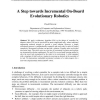130 search results - page 9 / 26 » Mobile robot learning by evolution of fuzzy controller |
SCAI
2001
13 years 9 months ago
2001
We apply evolutionary algorithm (EA) to the design of controller for adaptive robots. EAs can be successful for more complicated tasks, where traditional engineering methods strugg...
CEC
2007
IEEE
14 years 1 months ago
2007
IEEE
Abstract— Designing effective behavioral controllers for mobile robots can be difficult and tedious; this process can be circumvented by using unsupervised learning techniques w...
AIIA
1995
Springer
13 years 11 months ago
1995
Springer
Recently, a new approach that involves a form of simulated evolution has been proposed for the building of autonomous robots. However, it is still not clear if this approach may b...
FSKD
2007
Springer
14 years 1 months ago
2007
Springer
Evidence theory has been widely applied to uncertainty reasoning. In this paper a finite state machine with evidential reasoning is proposed to control autonomous robots. The Khep...
ICNC
2009
Springer
14 years 2 months ago
2009
Springer
A model-free, biologically-motivated learning and control algorithm called S-learning is described as implemented in an Surveyor SRV-1 mobile robot. S-learning demonstrated learni...

